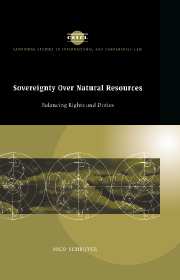Book contents
- Frontmatter
- Contents
- List of boxes, figures and tables
- Preface
- Acknowledgments
- List of abbreviations
- List of main symbols used in UN documents
- Glossary
- Table of cases
- 1 Introduction
- PART I The birth and development of the principle: the UN General Assembly as midwife
- PART II Natural-resource law in practice: from creeping national jurisdiction towards international co-operation
- PART III Balancing rights and duties in an increasingly interdependent world
- Introductory remarks to Part III
- 9 Rights and claims: seeking evidence of recognition in international law
- 10 Duties: the other side of the coin
- 11 Sovereignty over natural resources as a basis for sustainable development
- Appendices
- Bibliography
- Index
- Books in the series
Introductory remarks to Part III
Published online by Cambridge University Press: 23 October 2009
- Frontmatter
- Contents
- List of boxes, figures and tables
- Preface
- Acknowledgments
- List of abbreviations
- List of main symbols used in UN documents
- Glossary
- Table of cases
- 1 Introduction
- PART I The birth and development of the principle: the UN General Assembly as midwife
- PART II Natural-resource law in practice: from creeping national jurisdiction towards international co-operation
- PART III Balancing rights and duties in an increasingly interdependent world
- Introductory remarks to Part III
- 9 Rights and claims: seeking evidence of recognition in international law
- 10 Duties: the other side of the coin
- 11 Sovereignty over natural resources as a basis for sustainable development
- Appendices
- Bibliography
- Index
- Books in the series
Summary
Permanent sovereignty over natural resources, while a legal concept, is typically a product of the interaction of politics, economics and sociology of international relations. The decolonization process marked its genesis; and the efforts of newly independent States to enhance their opportunities for development had a profound impact on its evolution. Political and academic discussion of permanent sovereignty has focused on rights rather than on obligations. This is due to the fact that the newly independent States have looked upon permanent sovereignty as a counteracting factor, if not as an ‘antidote’ to the more traditional rights connected with resource management, such as the inviolability of contracts, a strict interpretation of pacta sunt servanda and of respect for acquired rights, and the right of home States to grant diplomatic protection to their nationals abroad. Developing countries challenged these rights by invoking ‘permanent sovereignty’ as the basis for claiming, among other things, the right to regain effective control over natural resources, to choose freely their own socio-economic system, the right to use freely their own natural resources and the right to expropriate or nationalize foreign property rights.
Logically, developing States were more interested in formulating rights reinforcing their sovereignty than in obligations restricting it. For a long time they tended to perceive any reference to obligations as a potential encroachment on their ‘permanent’, ‘full’ and ‘inalienable’ natural-resource sovereignly. All of these traditional rights and concepts are currently subject to change and are being replaced or complemented by new, usually more flexible insights.
- Type
- Chapter
- Information
- Sovereignty over Natural ResourcesBalancing Rights and Duties, pp. 255 - 257Publisher: Cambridge University PressPrint publication year: 1997

